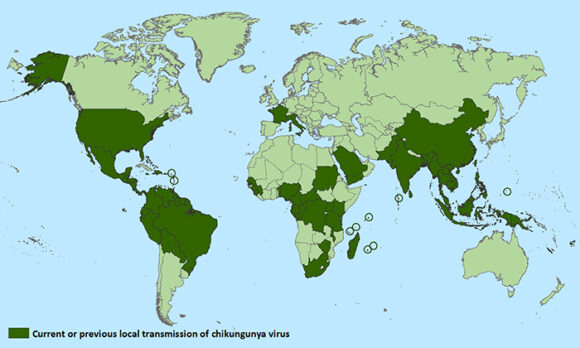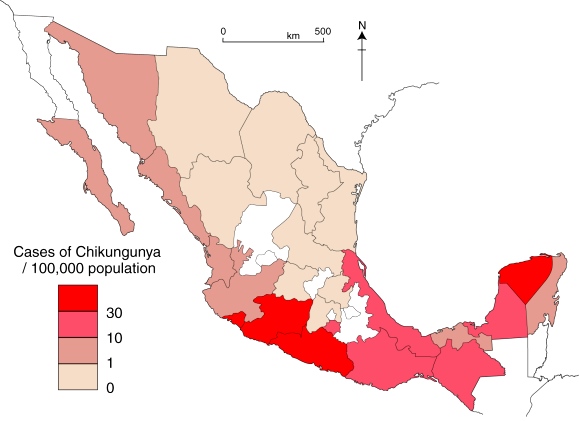It is now just over a year since the first locally locally transmitted cases of chikungunya were reported in Mexico. (Local transmission means that mosquitoes in Mexico have been infected with chikungunya and are spreading it to people).
The virus, first isolated in Tanzania in 1952, began to spread rapidly after an outbreak that originated in Kenya in 2004. By 2006, the virus had reached India, and by 2007 northern Italy. Imported cases were identified in Taiwan, France and the USA in 2010. In these stages, chikungunya was spread to new areas primarily by travelers infected with the virus.
The first locally-transmitted cases in the Americas were on the Caribbean island of St. Martin in 2013.
The chikungunya virus was first recorded in Mexico in October 2014 and has since spread rapidly from Chiapas through much of the country (map).
As of 24 October 2015, 9423 cases have been reported in Mexico in total. The states most affected (in terms of number of cases) are Guerrero (1620 cases since October 2014), Michoacán (1548), Veracruz (1203), Oaxaca (1151) and Yucatán (1131).
Two mosquito vectors (Aedes aegypti and Aedes albopictus) are involved in the spread of chikungunya. Aedes aegypti is exclusively tropical in distribution, but Aedes albopictus also thrives in temperate climes, giving chikungunya the potential to spread virtually throughout the Americas.
The number of cases spikes with the rainy season since mosquitoes breed in stagnant water. Curiously, about two-thirds of the cases in Mexico have been in females, and only one-third in males. Presumably, this is due to differences in work and/or living habits, with females having greater exposure than males to the mosquitoes involved.
There is no vaccine to prevent chikungunya or medicine to treat the viral infection.
The most common symptoms of chikungunya virus infection are fever and joint pain. Other symptoms may include headache, muscle pain, joint swelling, or rash. Joint pains can last months or even years. The disease is debilitating, but rarely fatal. Someone who has contracted chikungunya develops lifelong immunity (unlike dengue fever, where no such immunity exists).
Want to learn more?
- Chikungunya (CDC – Center for Disease Control)
- Chikungunya (World Health Organization)
- Current situation in Mexico (Spanish)
Related posts


Sorry, the comment form is closed at this time.